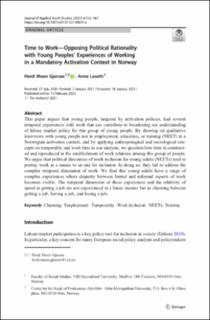| dc.contributor.author | Gjersøe, Heidi Moen | |
| dc.contributor.author | Leseth, Anne | |
| dc.date.accessioned | 2022-03-24T13:12:23Z | |
| dc.date.available | 2022-03-24T13:12:23Z | |
| dc.date.created | 2021-01-16T21:43:11Z | |
| dc.date.issued | 2021 | |
| dc.identifier.citation | Journal of Applied Youth Studies (JAYS). 2021, 4 (2), 153-167. | en_US |
| dc.identifier.issn | 2204-9193 | |
| dc.identifier.uri | https://hdl.handle.net/11250/2987404 | |
| dc.description | This article is licensed under a Creative Commons Attribution 4.0 International License, which permits use, sharing, adaptation, distribution and reproduction in any medium or format, as long as you give appropriate credit to the original author(s) and the source, provide a link to the Creative Commons licence, and Journal of Applied Youth Studies (2021) 4:153–167 165 indicate if changes were made. The images or other third party material in this article are included in the article's Creative Commons licence, unless indicated otherwise in a credit line to the material. If material is not included in the article's Creative Commons licence and your intended use is not permitted by statutory regulation or exceeds the permitted use, you will need to obtain permission directly from the copyright holder. To view a copy of this licence, visit http://creativecommons.org/licenses/by/4.0/. | en_US |
| dc.description.abstract | This paper argues that young people, targeted by activation policies, had several temporal experiences with work that can contribute to broadening our understanding of labour market policy for this group of young people. By drawing on qualitative interviews with young people not in employment, education, or training (NEET) in a Norwegian activation context, and by applying anthropological and sociological concepts on temporality and work time in our analysis, we question how time is constructed and reproduced in the establishment of work relations among this group of people. We argue that political discourses of work inclusion for young adults (NEETs) tend to portray work as a means to an end for inclusion. In doing so, they fail to address the complex temporal dimension of work. We find that young adults have a range of complex experiences where disparity between formal and informal aspects of work becomes visible. The temporal dimension of these experiences and the relativity of speed in getting a job are not experienced in a linear manner but as churning between getting a job, having a job, and losing a job. | en_US |
| dc.language.iso | eng | en_US |
| dc.publisher | Springer | en_US |
| dc.rights | Navngivelse 4.0 Internasjonal | * |
| dc.rights.uri | http://creativecommons.org/licenses/by/4.0/deed.no | * |
| dc.subject | Norway | en_US |
| dc.subject | NEETs | en_US |
| dc.subject | work inclusion | en_US |
| dc.subject | temporality | en_US |
| dc.subject | employment | en_US |
| dc.subject | churning | en_US |
| dc.title | Time to work – opposing political rationality with young peoples’ experiences of working in a mandatory activation context in Norway | en_US |
| dc.type | Peer reviewed | en_US |
| dc.type | Journal article | en_US |
| dc.description.version | publishedVersion | en_US |
| dc.rights.holder | © The Author(s) 2021. | en_US |
| dc.source.pagenumber | 153-167 | en_US |
| dc.source.volume | 4 | en_US |
| dc.source.journal | Journal of Applied Youth Studies (JAYS) | en_US |
| dc.source.issue | 2 | en_US |
| dc.identifier.doi | 10.1007/s43151-021-00031-x | |
| dc.identifier.cristin | 1872578 | |
| cristin.ispublished | true | |
| cristin.fulltext | original | |
| cristin.qualitycode | 1 | |

